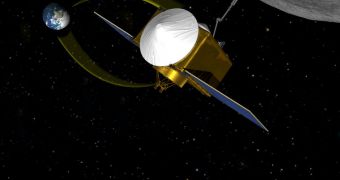The radio science component of the OSIRIS-REx mission will be managed by experts at the University of Colorado in Boulder (UCB). Experts here will be in charge of mapping the asteroid, in order to understand how the space rock formed and evolved over the eons.
The spacecraft, which NASA plans to launch in 2016, was recently selected as the latest addition to the New Frontiers space exploration program. It was chosen from a set of three final contestants.
By studying asteroids, the American space agency hopes to be able to gain a better understanding of the origins of the solar system. In turn, this could lead to more clues as to how life appeared and developed.
The UCB team will be part of the Origins-Spectral Interpretation-Resource Identification-Security-Regolith Explorer, (OSIRIS-REx) mission to the near-Earth asteroid 1999 RQ36. The probe will spend about 6 months in orbit around the large space rock.
The new flight is a sample-return mission, which means that its main goal is to collect samples from 1999 RQ36's surface, and then deliver them back to Earth for analysis. If successful, it will be the world's second spacecraft to pull this off.
As part of this effort, UCB Aerospace Engineering Sciences Department professor Daniel Scheeres will be managing the OSIRIS-Rex radio science team. The university will receive about $3 million in research funds over the course of the mission.
Using a dedicated instrument on the space probe, the professor and his team will characterize the mass and gravity field the asteroid generates. If all goes well, the researchers should obtain a comprehensive view of how the space rock's internal structure looks like.
“We essentially will be weighing the asteroid to see how the mass is distributed across it. We need to know the mass and gravity field of the asteroid before the spacecraft comes in contact with it,” the team leader explains.
He goes on to say that the endeavor will include at least one UCB postdoctoral researcher, as well as several additional graduate students. These scientists will help create the software necessary for the mission, and will also be involved in planning operations and adjacent research.
NASA officials estimate that OSIRIS-REx will cost the space agency about $800 million. The probe was selected over two other proposed missions, one of which was led by UCB experts, EurekAlert reports.

 14 DAY TRIAL //
14 DAY TRIAL //